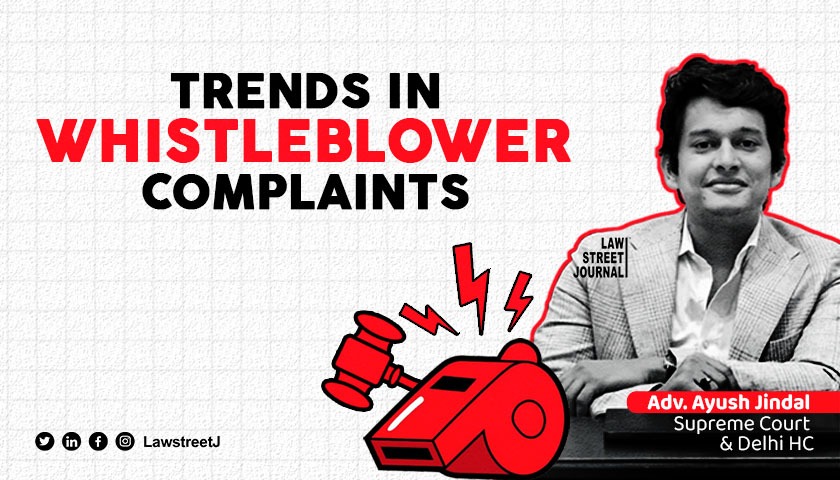NEW DELHI “Whistleblowers are the guardians of corporate integrity, bringing to light what miscreants would rather keep buried in darkness”
In India, whistleblowing has evolved from a perilous act of moral courage to a more structured and legally supported endeavour. The rise in whistleblower complaints in recent years highlights the increasing willingness of employees and stakeholders to report corporate misconduct. However, while legal protections exist, the gaps in enforcement and the complexities of the legal landscape often leave whistleblowers vulnerable.
The Legal Framework for Whistleblowers in India
India’s journey toward protecting whistleblowers began with the Whistleblowers Protection Act, 2014. The Act, aimed at safeguarding individuals who report corruption in government bodies, provided a much-needed legal framework to protect whistleblowers from retaliation. However, the law’s scope is limited, applying primarily to public-sector employees and excluding issues related to corporate misconduct or private-sector malfeasance. The amendments in 2015, which narrowed the scope further by barring disclosures related to national security and foreign affairs, have been criticized for weakening protections.
Another legal measure relevant to corporate whistleblowing is the Companies Act, 2013. Section 177 of the Act mandates that every listed company and certain other public companies must establish a vigil mechanism for directors and employees to report concerns, including fraudulent activities. This includes provisions for the protection of whistleblowers, but the Act lacks a robust mechanism for enforcement, particularly for non-listed companies, where such concerns often go unaddressed.
In addition, the Securities and Exchange Board of India (SEBI) has its whistleblower provisions under the SEBI (Prohibition of Insider Trading) Regulations, 2015. These regulations provide rewards for informants who disclose insider trading violations, thus incentivizing whistleblowing in financial markets. However, these regulations focus solely on market misconduct and do not extend to broader corporate malpractices such as fraud or workplace misconduct.
A Broader Scope: Expanding Areas of Whistleblower Concerns
While the original legal frameworks primarily addressed financial misconduct and public sector corruption, the range of whistleblower complaints has expanded in recent years to include issues related to corporate governance, workplace culture, and ethical violations. Complaints of gender discrimination, harassment, and unethical business practices are becoming more common, reflecting the growing awareness among employees of their rights and the need for ethical business practices.
The shift from purely financial fraud to broader corporate governance issues necessitates stronger legal frameworks that encompass not only the traditional areas of fraud and corruption but also workplace culture and ethical standards. India’s legal protections must evolve to account for these growing areas of concern, ensuring that whistleblowers who expose such misconduct are protected.
Legal Challenges and Gaps in Enforcement
Despite the existence of laws such as the Whistleblowers Protection Act and the provisions under the Companies Act, significant gaps remain in terms of enforcement and protection. One of the key issues is the lack of a centralized agency or body tasked with overseeing whistleblower complaints and ensuring that they are properly addressed. Many companies have internal mechanisms in place, but there is often little oversight to ensure that these mechanisms are functioning properly.
Moreover, there is a need for whistleblower protections to extend beyond the workplace. Currently, legal protections are largely limited to preventing retaliation within the company, such as wrongful termination. However, whistleblowers often face defamation suits or other legal challenges outside the corporate sphere, making it difficult for them to come forward. Introducing legal immunity from such lawsuits, as seen in the Public Interest Disclosure Act in the UK, would strengthen the deterrent effect and give whistleblowers greater confidence in reporting misconduct.
Another critical area for improvement is the protection of anonymity. While many whistleblower policies, including those under SEBI regulations, provide for anonymous reporting, the reality is that whistleblowers often fear exposure. Ensuring that whistleblowers can safely and anonymously report misconduct without fear of retaliation or identification is essential for fostering a culture of transparency.
Strengthening Whistleblower Protections: The Path Forward
India must take decisive steps to strengthen its whistleblower protection laws. This begins with expanding the scope of the Whistleblowers Protection Act to include private sector employees and corporate misconduct more explicitly. The law should also be extended to cover areas beyond corruption and fraud, incorporating issues related to workplace harassment, discrimination, and other forms of corporate misconduct.
In addition, enforcement must be strengthened. The creation of a centralized body, perhaps within the Central Vigilance Commission (CVC) or SEBI, to oversee all whistleblower complaints—whether in the public or private sector—would ensure that these complaints are treated with the seriousness they deserve. This would also ensure that there is accountability for companies that fail to act on legitimate complaints.
Lastly, India should consider following the lead of jurisdictions like the United States, where the Dodd-Frank Wall Street Reform and Consumer Protection Act provides significant financial rewards for whistleblowers. This incentivizes individuals to come forward with valuable information about corporate misconduct and ensures that their contributions are recognized and rewarded.
Conclusion
Whistleblowers play a vital role in maintaining the ethical backbone of corporate India. However, for whistleblowers to be effective, they need robust legal protections, comprehensive enforcement mechanisms, and a culture of accountability. By strengthening legal frameworks and expanding protections to include all aspects of corporate governance, India can ensure that whistleblowers are empowered to hold corporations accountable for their actions.
Author Ayush Jindal:
Ayush Jindal is a distinguished Advocate in the Supreme Court and Delhi High Court specializing in White Collar Crimes, Criminal Litigation, Corporate Litigation, Arbitration, Insolvency & Bankruptcy. He has garnered significant recognition for his expertise in handling high-profile cases, representing prominent personalities such as journalist Arnab Goswami, ex-cabinet minister Praful Patel, and Ratul Puri, Chairman of the Board of Directors of Hindustan Power Projects.
[Disclaimer: ……]






![SEBI suppressed material facts in Adani probe, Supreme Court told [Read Affidavit]](/secure/uploads/2023/09/lj_3587_70b0a163-cf64-4d91-adb7-290228d0098c.jpg)


![Adani-Hindenburg row: SC rejects plea to transfer probe from SEBI to SIT [Read Judgment]](/secure/uploads/2024/01/lj_2804_WhatsApp_Image_2024-01-03_at_12.08.44_PM.jpeg)






